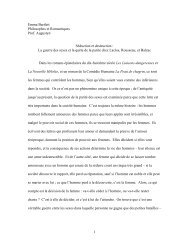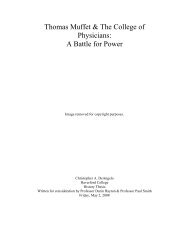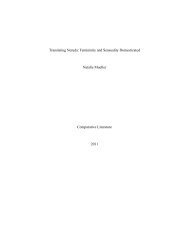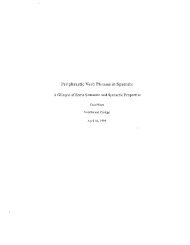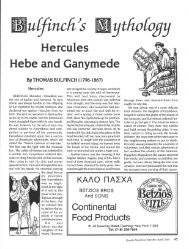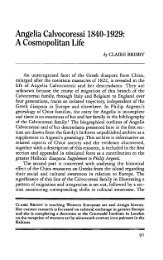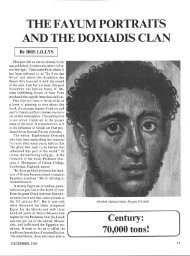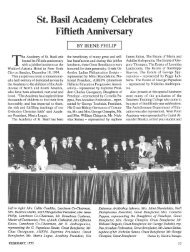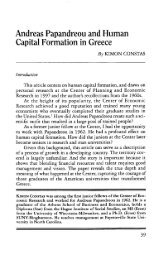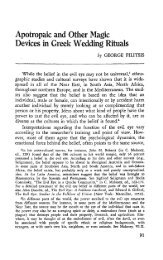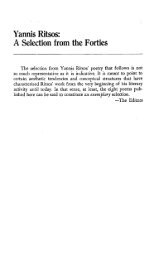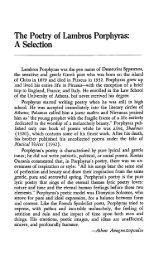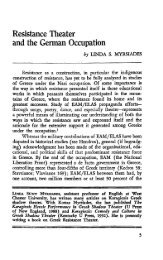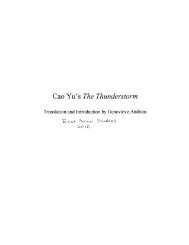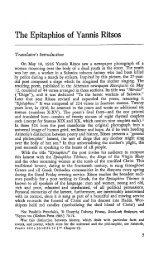Mythistorema - Triceratops Home
Mythistorema - Triceratops Home
Mythistorema - Triceratops Home
Create successful ePaper yourself
Turn your PDF publications into a flip-book with our unique Google optimized e-Paper software.
52 JOURNAL OF THE HELLENIC DIASPORA<br />
which, as already mentioned," is considered by the poet as a symbol of<br />
the erotic impulse.<br />
Seferis, describing here his country, full of mountains, roofed by a<br />
low sky, with a complete absence of water—no rivers, no wells, no fountains—and,<br />
above all, blocked by the mythological rocks, creates a picture<br />
of absolute sterility. Even the cisterns are empty, and their symbolic<br />
"stagnant hollow sound" resembles "our love" and "our bodies."" Thus,<br />
the association of the absence of water with this love and with the impossibility<br />
of a journey to recover the golden fleece becomes here explicit.<br />
As already mentioned in the introduction to this sequence, Seferis<br />
wrote in his Journals that if he had read T.S. Eliot's Four Quartets at<br />
the time he wrote <strong>Mythistorema</strong>, he would have used a passage from it<br />
as an epigraph." In the light of this remark, one can understand better<br />
why love here is a "stagnant hollow sound" for his persona while "our<br />
marriages,—the dewy garlands, the marriage fingers,/Have become insoluble<br />
riddles for our souls." They cannot even imagine a past with love<br />
and spring. The rhythm of the sensuous body, what Seferis elsewhere<br />
calls "the lovely dance,'" and what Eliot implies when he says "the<br />
intense moment," has here been extinguished.<br />
Demetrios Nikolareizis, in his essay "The Presence of <strong>Home</strong>r in<br />
Modern Greek Poetry," refers to poem "10" of <strong>Mythistorema</strong> as an<br />
example of the journey that has not even been attempted. He writes that<br />
the poet suggests this idea by using as narrators "Mysterious persons who<br />
live a sterile life near the shore, dying from longing for the sea but<br />
unable to embark on a journey—as if the seaways were closed or the drive<br />
for voyage had been drained inside them.""<br />
The poem ends not only with this nostalgia for a journey that cannot<br />
be realized and remains an impossible dream but also with the image of<br />
the "broken timbers," suggesting voyages that ended in shipwreck and<br />
never reached their destination.<br />
'See above, p. 42.<br />
43Seferis wrote a long allegorical poem with the title The Cistern, in which this<br />
central symbol, described as "a den of secret water," most probably stands for sterile<br />
love.<br />
"Journal E, 59. The passage, from "East Coker," is:<br />
... As we grow older<br />
The world becomes stranger the pattern more complicated<br />
Of dead and living. Not the intense moment<br />
Isolated with no before and after,<br />
But a lifetime burning in every moment<br />
And not the lifetime of one man only<br />
But of old stones that cannot be deciphered.<br />
""The Thrush." Compare also "And a dance among the oleanders" (Mythistorerna,"6").<br />
"Nikolareizis, 231.



